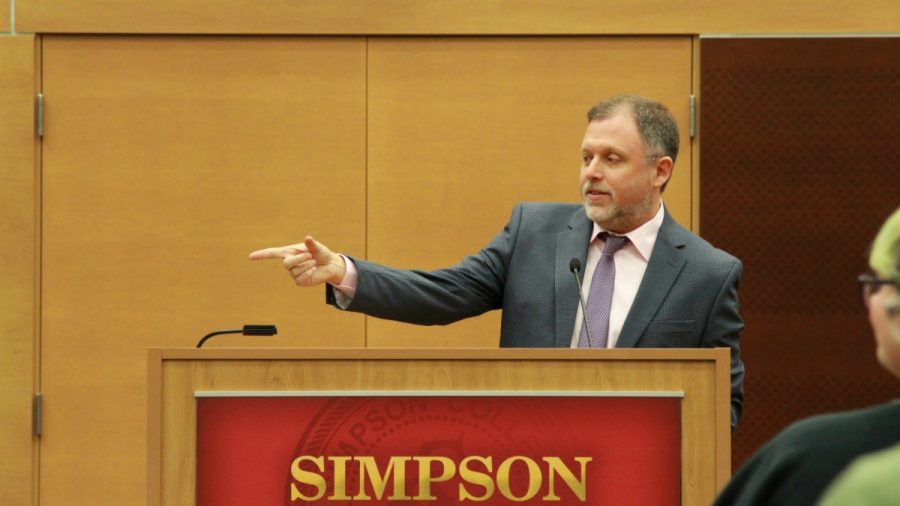Racism runs rampant in Trump era, says anti-racism speaker
October 20, 2017
INDIANOLA, Iowa — If you want to understand why NFL players are taking a knee when the national anthem plays, you need to understand the history of race in America.
Tim Wise, who has gained national recognition for speaking about race relations in the U.S., visited Simpson College on Monday, highlighting the prevalence of racism — especially in the age of President Donald Trump where racial tensions have flurried.
Such controversies include the president’s hesitancy in denouncing white supremacy, chastising NFL players who are protesting racial inequality and lamenting Confederate statues.
While Trump ignites the fire with inflammatory comments — such as “Get that son of a bitch off the field right now, he’s fired” when addressing how NFL owners should respond to players who kneel in protest — the racism was still existent during former President Barack Obama’s term, but the awareness and activism was perhaps dormant, Wise said.
“For eight years, a lot of white folks, I gather, apparently the majority of us, were like, ‘Oh, but (racism) can’t be a thing because a black dude is president, and I actually voted for him, and I have a black friend, and I dated an Asian woman, and I have a dream catcher in my rearview mirror so that means my great-great-grandmother was a Cherokee princess,” Wise said. “No, sweetheart, she was not. But that’s a different lecture for a different day.”
Even when political leaders instigate racist rhetoric, the problem, Wise said, is institutional. White people separate themselves from “the bad guys” because “if we’re in a bad system — that could be a criminal justice system, an educational system, a system in a labor market that’s inequitable — we become part of a problem that we don’t want to be.”
He said African-Americans are greatly misrepresented in the criminal justice system because they make up 13 percent of drug users, but 37 percent of them are arrested and incarcerated for drug usage.
“David Duke (a white supremacist) didn’t do that. Police did that. Prosecutors did that. Judges did that. Juries did that,” Wise said. “That’s on the justice system that treats the illegality of some different than others.”
According to the Center for American Progress:
- Black men face longer prison sentences than their white, non-Hispanic counterparts for similar crimes
- One in three black men are expected to go to prison sometime in their life, and they receive longer sentences than white offenders
- African-American youths have higher rates of juvenile incarceration
- African-American women are twice as likely to be imprisoned than white women
“These are things that I know,” said Katrina Cummings, assistant professor of education, who is African-American. “The statistics, they weren’t surprising.”
Cummings said she got emotional when Wise started talking about slavery in America and its impact on today’s society. “He was being brutally honest,” she said. “It seems like he was stern on his beliefs, and that was something that stood out for me.”
In order for people to change what Wise calls a corrupt system, Cummings said people need to be aware of their biases.
“We all have them,” she said. “He talked about minimizing the pain for others, and so I think having that perspective will take us in the direction we need to go.”
Lauren Villafuerte, a sophomore majoring in physics, said she has been subject to “a lot of ignorance.” Villafuerte, who is of Japanese and Filipino descent, acknowledged there are people like Wise who recognize white privilege, racism and sexism as societal problems and are actively trying to change it.
“Do something, and don’t just sit there and be like, ‘Wow, that’s amazing. He’s brave enough to speak out,’” she said. “They just walk by and not doing anything about it. I want them to actually do something about it.”
Wise tackled the NFL protests, saying no one is protesting the American flag nor the national anthem itself but rather the centuries of racial injustice endured by minorities.
He also lashed out at Trump and his supporters for rallying behind the cry, “Build the wall,” saying a physical barrier along the U.S.-Mexico border is geographically and economically unfeasible.
“You know what the wall doesn’t stop? It doesn’t stop capital from being transferred,” he said. “You can still move capital. You can still move products. You just can’t move labor.”
Wise said that impasse results in favoring capital and tilting the scales against working people on both sides of the border.
He offered this bit of optimism: “Once you realize that the danger is the same as it’s always been, once you realize that the monster is not new, it’s actually less frightening.”
Wise said he uses his privilege to benefit others by telling stories and narratives because he’s “fairly certain you won’t remember the statistics.”
And while he admits his lectures won’t convince everyone who listens, his hope is that white people at least own up to their dysfunctions, which is the first step in turning the wheel toward justice.







